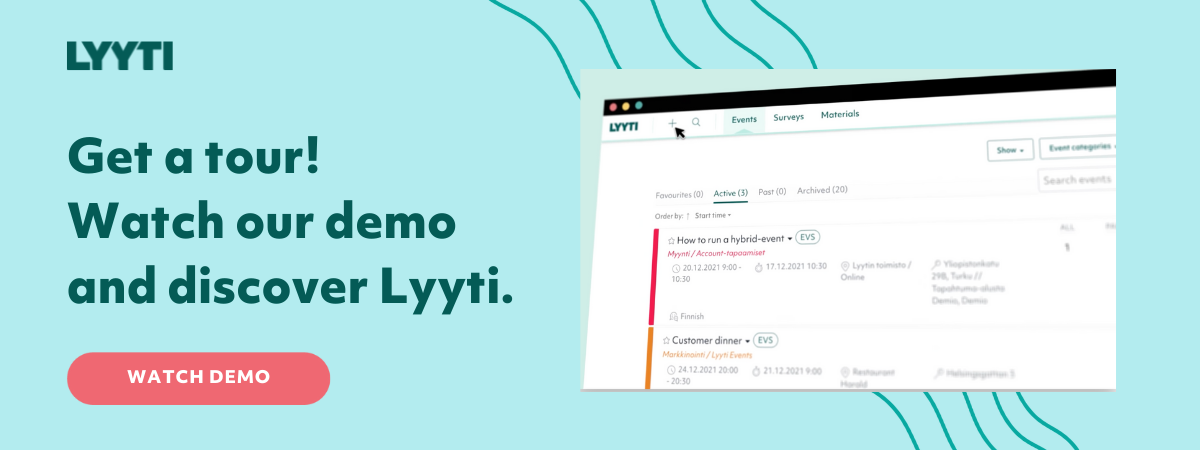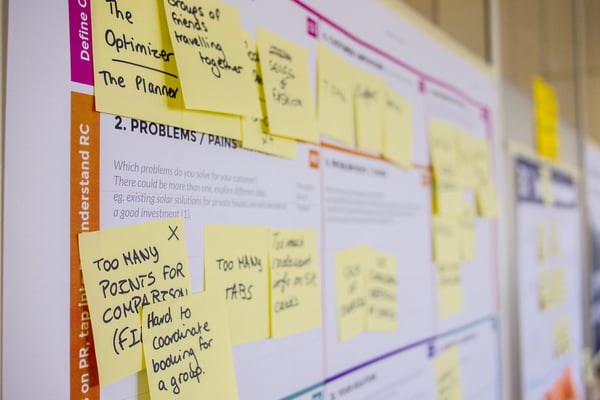Bet you didn’t come to think of it, but the financial services sector is one of the biggest industries to organise events. In-person events have certainly been a challenge in recent times due to Covid-19 but we see normality returning to the industry. Infact, some of Lyyti’s customers estimated that some 30% of their events during the first half of the year would be live but that figure ended up being close to 70%.
So why are events, and particularly live events, so impactful among the financial services sector? Live events give an opportunity in financial services to make a connection with customers that is hard to replicate in another manner.
Events have always played an important part in financial services because they offer a way to connect with customers in person. The most important factor in doing business in the financial world is founding it on relationships and trust. As suggested by the volumes of produced events and our own strong belief, in-person encounters are the perfect tool to build a strong foundation for different types of relationships.
The last couple of years have challenged every event producer due to the pandemic. Online events have tried to step in and they have offered some opportunities but a virtual meeting can’t replicate everything a live event offers. The value of contact and the opportunity to get to know prospective customers as well as to understand current ones, is extremely helpful in creating better relationships.
Your website can only do so much! Events give you the chance to interact and respond in real time to attendees, learn more from them and respond to show the value of your products and brand. These are truly meaningful encounters!
The importance of live events in financial services
Events serve a purpose that can’t be replicated in another way. There’s a human touch to being face-to-face with someone, explaining your needs and having them listen, understand and respond. It’s a stronger bond than simply filling out a website form.
This could be referred to as the special “chemistry of events”. A place where customers and financial service experts get to talk about opportunities and solutions together. Combining the above two points can bring an emotional angle to the interaction that doesn’t often exist in other forms.
Research has even shown that there is an emotional need from customers to create connections with their financial service agent and events are a powerful way to meet this.
Financial services can often be seen as a dry topic, so a channel that opens that up to bring feeling into the process should be utilised. This is why live events should be seen as essential for financial services.
Discover more about how events can be used to evoke emotions in episode 2 of the Event Success Insights podcast.
Creating trust and growing loyalty
What does all this add up to though? If you use financial services events to generate a connection, what is the outcome?
Trust is the core tenet to a relationship between a financial service agent and their customer. Creating and reinforcing an emotional connection in a relationship feeds into trust and loyalty. Trust is essential in financial services and loyalty is an area where financial services agents struggle. Events give them a chance to build both of those.
How do you build that trust though? There are 5 key points to consider:
- Build content at your event that is related to the attendees interests
- Discover what your attendees pain points are
- Find out why they are attending. What is it they want to achieve there?
- Listen to them and respond in kind.
- Personalise your follow-up and make sure to address the discussions and possible concerns of your prospect or customer.
This information shows you’re listening to their needs and problems. Not just trying to sell your product(s). By acknowledging their challenges and discussing them, you’re showcasing your expertise in an area where they are looking for help. This put together with the emotional side of the human connection will combine to create an opening for that sought after feeling of trust.
With new customers you’re only starting to build that trust but with current customers it’s something to nurture consistently. We know one of the pain points for financial services agents is customer loyalty. Events are a way to strengthen that relationship and encourage that desired loyalty. The key here is that personal contact that you are able to have, combined with addressing topics of interest and needs of your customers. It’s an opportunity to develop relationships, but also, as said before, display your expertise in the places where they need help.
It’s harder for a customer to break a relationship after they’ve put a face to a name, especially one that has demonstrated well-targeted knowledge. All together, financial services events are a vital tool to encourage both trust and loyalty in customers.
The impact of improving events
Face to face events can create lasting impressions. How do you make those impressions even better though? Seeing events as a one-off occurrence misses the opportunity to make them part of a larger process of continual improvement.
No event is perfect, so recognising where it could have been improved opens up the possibility of doing even better next time. This is where the idea of Event Success Management comes into play. Even when events aren’t directly connected, it creates a method to analyse and improve them on an ongoing basis. Superior events mean happier attendees, and a more trusting environment.
Maximising your return from financial events
If you’ve understood the value of events and what they can bring you in financial services, and are ready to improve them, you can start to consider in your planning how to get the best sales result from your events.
This was discussed by Joonas Valkonen, a Marketing Specialist at Lyyti, in a recent podcast. Unfortunately only available in Finnish but here’s the link if you happen to speak the language.
For those that don’t yet understand Finnish the main points to consider are:
- Ensure there is enough time allowed at your event to mingle and build relationships
- Send the best suited people to events as your representatives. Some people excel in that environment!
- Set goals related to why the event was organised. Examples could include:
- Customer acquisition
- Reducing risk of churn
- Relationship building
- Have a plan on how to utilise data after the event. Examples of data you can collect from an event that you may not have considered:
- Discussions during the event
- Pre-collected information
- Networking contacts
No one-off event can promise fame and fortune, but perfecting your pitch through events is a start worth investing in. Consistency is key as research collated by Hubspot shows: “80% of sales require 5 follow-up calls whereas 44% of salespeople give up after one follow-up call.”
Better events make for a better customer experience
We can't underline enough the importance of events when it comes to building relationships but also when accelerating sales. Equally important is to understand how to continually improve on your performance and the quality of your events using a system like the Event Success Management. Combining these, your attendees will trust you more and you can build better customer loyalty as a result.
It all comes down to a simple equation. Despite the challenges the pandemic brought, events remain an essential approach for success in financial services. Building trust and loyalty with customers are key advantages to holding events, especially when they are tailored to their needs.
By adopting a framework that allows you to improve your events on an ongoing basis, you have the opportunity to get even better results from them. An event management platform like Lyyti can help you create, organise and run your event, and it also ties into the Event Success Management methodology. Watch our demo or book a live demo session with our experts and find out more.
Hero photo by Towfiqu barbhuiya on Unsplash









